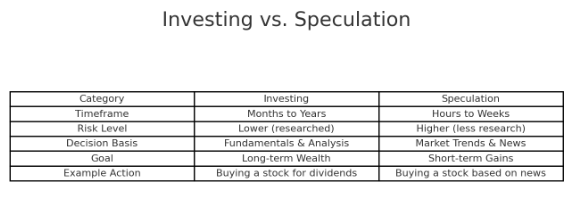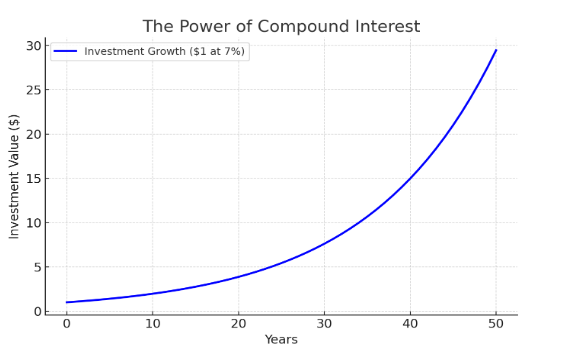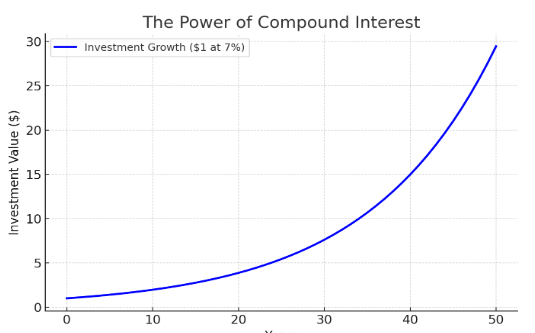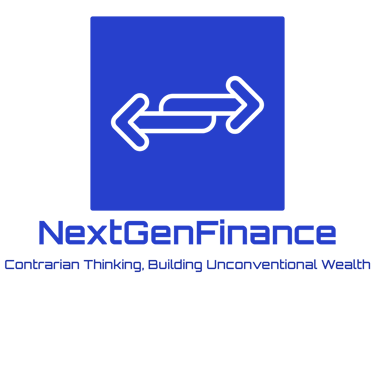Get our free Debt vs Invest Calculator — click here to access it
What Is Investing? A Beginner’s Guide to Growing Wealth
Learn what investing is, how it works, and how it differs from speculation. Understand key concepts like compound interest to grow your wealth.
INVESTINGINVESTING FOR BEGINNERSFINANCIAL BASICS
2/1/20259 min read
What is Investing?
In the novel Alice in Wonderland, the Cheshire Cat tells Alice “we’re all mad here” to explain the bizarre and illogical world that she is about to enter into. This is because in Wonderland, madness is considered completely normal. Welcome to the world of investing…we’re all mad here too. It’s only fair that before we thrust you into the insane world of investing that you have some insight into what investing is, and why it should matter to you.
Investing in the simplest sense, means putting resources (usually money) into something, for a period of time, with the expectation of gaining a profit and/or benefit. For example, imagine you own a small landscaping business. In order to take on bigger contracts you may need to buy certain equipment such as a backhoe, or even a dump truck. As you can imagine this could be a costly endeavor. But it allows you to offer higher cost services to paying customers. Provided you are able to obtain those customers, the long term income potential from having the equipment outweighs the short-term costs of the machinery. In this case we would view the purchase of the equipment as an investment.
Investing vs Speculation
It’s key that you understand the difference between investing and speculation. Investing involves you allocating your resources into an asset for the long term. It is generally made based on an assessment of the long term return of the asset. There is a process of due diligence performed prior to making the decision to invest.
On the other hand, speculating is generally made when you are trying to make a gain on some short term fluctuations in a price. A speculator often is less concerned about the underlying value of the asset, and more worried about capitalizing on some potential price change. They may operate based on incomplete information such as a news story or even a hunch. Think of a speculating timeframe as something that is in hours, days, or a week, while the investing time frame is for months or years.
Using the previous example of the landscaping company, an investor would compare the initial cost of the equipment to the potential increase in company profits. If the increase in profits significantly outweighs the cost of the equipment, this would be viewed as a good investment. The more certain the investor is of the increase in company profits the better the investment becomes. Although it doesn’t apply to this industry, a speculator in this case may instead purchase the equipment based on a news story that steel prices are increasing. The downstream impact being the cost of the equipment will increase too. They will buy with the intention to sell to capitalize on this short term gain.
Personal Finance
In personal finance, investing generally means buying assets such as real estate, stocks, and bonds. The goal is not just to recover the initial investment, but to make a profit. The profit is commonly represented as a percentage and referred to as the rate of return.
For example, If I buy a stock today for $100 and expect to earn a 10% annual rate of return—keyword, annual (you’ll see why we are so picky with wording when you read the stock & bonds section)—then theoretically, I should have $110 by this time next year. That means I get my original $100 back, plus $10 in profit.
Why does it matter?
Now that you understand what investing means, the next question is: why should it matter to you? The obvious answer is that understanding investing can help you make more money and/or conserve the money you already have. But it goes beyond that… investing will allow you the ability to actually achieve financial freedom. Having good financial habits is half the battle. The other half is actually using those habits to invest in cash flowing assets. Investing long enough will allow you to have enough money to take career risks (or a break), retire early, and be able to help your loved ones financially.
Investing also allows you to gain access to the unofficial eighth wonder of the world. Did you know that $1 invested at age 18 can grow to nearly $30 by the time you're 68, without adding another dollar? How could $1 invested at 18 grow to nearly $30 by the time you're 68, you’re probably thinking? The secret is the eighth wonder of the world, compound interest. Compound interest is the process where the interest you earn on an investment is reinvested, which results on you earning interest on both your initial investment and the interest that has been added to it. It’s like a snowball effect—the longer your money is invested, the more it grows.
Let's break it down with an example. Suppose you invest $1 at an annual interest rate of 7%. After one year, you'd have $1.07. In the second year, you earn 7% not just on your original $1, but also on the $0.07 interest you earned in the first year. So, at the end of the second year, you’d have about $1.14. Now to most people, that might not sound like much at first, but over time, it makes a huge difference. By the end of the third year, you’d have about $1.22, and it keeps growing from there. However, the real magic happens over decades. Here’s where it gets exciting. If you keep that $1 invested at 7% annual interest for 50 years, by the time reach 68 years old, it would grow to almost $30.
That’s the power of compound interest—your money grows exponentially over time (remember when we told you that investing was about thinking in months/years). This is why starting early is so important. The earlier you start investing, the more time your money has to grow through compound interest. Even small amounts can turn into significant sums over a long period. To put it simply, compound interest is earning interest on interest. It’s one of the most powerful tools in personal finance and a key reason why investing matters. So, if you want to build wealth and secure your financial future, understanding and leveraging compound interest, which is most effective with investing, is crucial. Start investing as early as possible, and let father time work his magic on your money.
Further Reading
Disclaimer: The information discussed in this blog is not intended to serve as financial advice. It is meant for educational purposes only. Please consult a personal financial expert before making any financial decisions.






What is Investing?
In the novel Alice in Wonderland, the Cheshire Cat tells Alice “we’re all mad here” to explain the bizarre and illogical world that she is about to enter into. This is because in Wonderland, madness is considered completely normal. Welcome to the world of investing…we’re all mad here too. It’s only fair that before we thrust you into the insane world of investing that you have some insight into what investing is, and why it should matter to you.
Investing in the simplest sense, means putting resources (usually money) into something, for a period of time, with the expectation of gaining a profit and/or benefit. For example, imagine you own a small landscaping business. In order to take on bigger contracts you may need to buy certain equipment such as a backhoe, or even a dump truck. As you can imagine this could be a costly endeavor. But it allows you to offer higher cost services to paying customers. Provided you are able to obtain those customers, the long term income potential from having the equipment outweighs the short-term costs of the machinery. In this case we would view the purchase of the equipment as an investment.
Investing vs Speculation
It’s key that you understand the difference between investing and speculation. Investing involves you allocating your resources into an asset for the long term. It is generally made based on an assessment of the long term return of the asset. There is a process of due diligence performed prior to making the decision to invest.
On the other hand, speculating is generally made when you are trying to make a gain on some short term fluctuations in a price. A speculator often is less concerned about the underlying value of the asset, and more worried about capitalizing on some potential price change. They may operate based on incomplete information such as a news story or even a hunch. Think of a speculating time frame as something that is in hours, days, or a week, while the investing time frame is for months or years.
Using the previous example of the landscaping company, an investor would compare the initial cost of the equipment to the potential increase in company profits. If the increase in profits significantly outweighs the cost of the equipment, this would be viewed as a good investment. The more certain the investor is of the increase in company profits the better the investment becomes. Although it doesn’t apply to this industry, a speculator in this case may instead purchase the equipment based on a news story that steel prices are increasing. The downstream impact being the cost of the equipment will increase too. They will buy with the intention to sell to capitalize on this short term gain.
Personal Finance
In personal finance, investing generally means buying assets such as real estate, stocks, and bonds. The goal is not just to recover the initial investment, but to make a profit. The profit is commonly represented as a percentage and referred to as the rate of return.
For example, If I buy a stock today for $100 and expect to earn a 10% annual rate of return—keyword, annual (you’ll see why we are so picky with wording when you read the stock & bonds section)—then theoretically, I should have $110 by this time next year. That means I get my original $100 back, plus $10 in profit.
Why does it matter?
Now that you understand what investing means, the next question is: why should it matter to you? The obvious answer is that understanding investing can help you make more money and/or conserve the money you already have. But it goes beyond that… investing will allow you the ability to actually achieve financial freedom. Having good financial habits is half the battle. The other half is actually using those habits to invest in cash flowing assets. Investing long enough will allow you to have enough money to take career risks (or a break), retire early, and be able to help your loved ones financially.
Investing also allows you to gain access to the unofficial eighth wonder of the world. Did you know that $1 invested at age 18 can grow to nearly $30 by the time you're 68, without adding another dollar? How could $1 invested at 18 grow to nearly $30 by the time you're 68, you’re probably thinking? The secret is the eighth wonder of the world, compound interest. Compound interest is the process where the interest you earn on an investment is reinvested, which results on you earning interest on both your initial investment and the interest that has been added to it. It’s like a snowball effect—the longer your money is invested, the more it grows.
Let's break it down with an example. Suppose you invest $1 at an annual interest rate of 7%. After one year, you'd have $1.07. In the second year, you earn 7% not just on your original $1, but also on the $0.07 interest you earned in the first year. So, at the end of the second year, you’d have about $1.14. Now to most people, that might not sound like much at first, but over time, it makes a huge difference. By the end of the third year, you’d have about $1.22, and it keeps growing from there. However, the real magic happens over decades. Here’s where it gets exciting. If you keep that $1 invested at 7% annual interest for 50 years, by the time reach 68 years old, it would grow to almost $30.
That’s the power of compound interest—your money grows exponentially over time (remember when we told you that investing was about thinking in months/years). This is why starting early is so important. The earlier you start investing, the more time your money has to grow through compound interest. Even small amounts can turn into significant sums over a long period. To put it simply, compound interest is earning interest on interest. It’s one of the most powerful tools in personal finance and a key reason why investing matters. So, if you want to build wealth and secure your financial future, understanding and leveraging compound interest, which is most effective with investing, is crucial. Start investing as early as possible, and let father time work his magic on your money.
Further Reading
Disclaimer: The information discussed in this blog is not intended to serve as financial advice. It is meant for educational purposes only. Please consult a personal financial expert before making any financial decisions.






